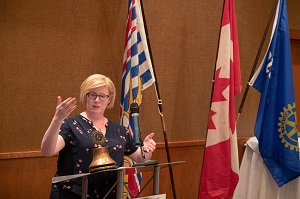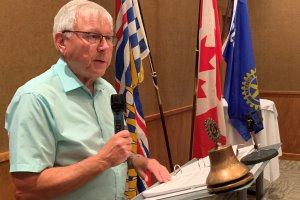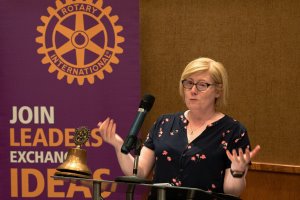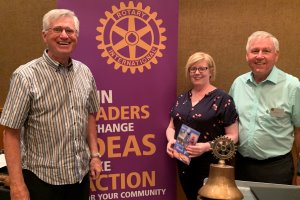
Excerpts from a presentation about the past 18 months in Canada and federal policies planned or enacted, which Hon. Carla Qualtrough, MP, Delta, and Minister of Employment, Workforce Development and Disability Inclusion gave to the Rotary Club of Ladner on July 27, 2021, are reported below.
 |  |
| President Denis Denishuk | One of the club's first in person meetings in more than eight months |
Hon. Carla Qualtrough, MP, Delta, and Minister of Employment, Workforce Development and Disability Inclusion spoke to the Rotary Club of Ladner on July 27, 2021
Thanks for having me here today. I’d like to acknowledge that we are on the traditional territory of the Tsawwassen and Musquem First Nations.
As you may know, I returned from Japan last night where I attended the first 4 days of the Olympic Games on behalf of the Government of Canada. Let me assure you that leading up to, during, and upon my return, I followed all COVID protocols.
In fact, having been to many Games in the past, I can tell you that very strict measures were in place to ensure the safety of athletes, coaches, officials and the very few of us who attended as dignitaries. I attended the Opening Ceremonies and a lot of sport events. In fact, I saw all 7 of our Delta Olympic athletes compete. I was very proud.
It was exciting to see Canadian athletes perform, but the empty stands and lack of cheering and spectators was a stark reminder that the world is very much in the middle of a pandemic.
This past 18 months have been very difficult for Canada and the world. There have been many challenges both here in BC and across the country. 2020 stared with blockades in protest of the construction of the gas pipeline in Northern BC. We had a snowbird airplane crash and lives were lost. We had a navy helicopter crash and more lives were lost. We had the horrific Nova Scotia mass shooting. There have been horrific discoveries of unmarked graves of hundreds of indigenous children forced into the residential school system. We are experiencing another summer of devastating wildfires here in BC -we have lost entire towns (Lytton), and again lives have been lost.
And of course there is the ongoing pandemic that has changed our lives forever.
That is a lot. But there is hope and light at the end of the tunnel.
 |  |
| Hon. Carla Qualtrough, MP, Delta | Minister Qualtrough is thanked by Past District Governor Chris Offer and President Denis Denischuk |
Let me give you the most recent COVID numbers for BC and Canada as of yesterday.
To date, approx. 150,000 people in BC have contacted COVID-19: 1,768 people have lost their lives, including 1 person yesterday. There are 695 active cases, with 43 people in hospital including 17 in ICU. 80.6% of eligible people 12 and older in B.C. have received their first dose of COVID-19 vaccine and 61.3% have received their second dose.
The national numbers are as follows:
• 1,427,342 people have had COVID-19
• 26,553 Canadians have lost their lives
• 80.7% of the Canadian population aged 12+ have received 1 dose and
• 63.7% have received 2 doses..
So many families in our country are grieving. So many families are struggling. The vaccine numbers are hopeful, but we are not out of the woods yet.
Strong and immediate public health measures are absolutely required in addition to vaccines.
But as much as my recent trip to Japan reminded me of the stark reality that we are not there yet, they also gave me hope and optimism.
And it highlighted the need to vaccinate the world.
Vaccines are not available in many countries – and other countries don’t have enough to vaccinate our people.
It further highlighted the need to educate and curtail the misinformation that is out there around vaccination.
For our part, the Government of Canada is taking a leadership role in these efforts. We are donating millions of doses through COVAX. We are working through the G7 and G20 – and very closely with the UN.
All of this while we are working hard here at home to vaccinate Canadians get our economy back on track.
Speaking of the economy, let me give you a quick snapshot.
Well, the good news is that our unemployment rate declined in June and now sits 7.8% - still 2.2% higher than pre-pandemic levels. Put another way, of the 3,5 million jobs lost since the start of the pandemic, almost 3.2 million jobs have been recovered – or around 90%. But we are still 340,000 jobs shy of where we were pre-pandemic.
This is promising news, but what it also means is that many Canadians remain unemployed, and many more have reduced hours.
And this job recovery has not been even –particular groups have not recovered well – women, youth, indigenous, racialized Canadians, and PWD.
Let me next give you a quick overview of our pandemic response approach and our recovery plan moving forward
First, we decided early on to do whatever it takes to keep Canadians safe and get the country through this pandemic.
Second, we decided to support workers and businesses – to keep as many businesses afloat and as many workers attached to the labour market – in order to best position ourselves to come roaring back when the pandemic was over.
We also decided to support workers who no longer had jobs, and to target groups particularly hard hit like seniors and persons with disabilities, in order to minimize individual and family hardship.
And third, we decided that the Government of Canada was better positioned than individuals and families to take on pandemic debt. We knew that bills would still have to be paid - mortgages and rent, food, hydro. With the interest rates available to our government, it was more prudent to do the borrowing instead of individuals using credit cards and credit lines with high interest rates.
In fact, more than 8 out of government 10 dollars spent during this pandemic have been federal dollars.
As you know, I have been at the centre of our pandemic response. I have been a member of our Cabinet COVID committee since day one – a group that met 5 sometimes 6 times a week for many months, and still meets 2 or 3 times a week.
I was responsible for many of our support measures, including the CERB, the student benefits, and our direct payments to persons with disabilities and seniors.
I can assure you all that at every step, even though sometimes there was great uncertainty, we worked hard to make the best decisions with the information we had. We changed course when we had to, and leaned heavily on public health experts and doctors.
I believe our overall approach has paid off.
We have not seen excessive levels of mortgage defaults or personal bankruptcies.
Canada’s COVID Response Plan has effectively bridged Canadians through the crisis.
And the international financial community has expressed confidence and given praise to our approach. The IMF has said that our decisive action helped avoid larger economic and social losses.
Turing to the future, this year’s budget laid out our priorities moving forward.
- First, the ongoing fight against COVID-19
- Second, creating Jobs and Growth
- Third, leaving no one behind (Resilient and Inclusive)
As I said, the fight against COVID-19 is not over. The Budget invests in speeding up vaccination roll out, protecting our seniors, strengthening our health systems, supporting mental health, and health research.
We are also committed to seeing workers and businesses through to recovery by extending emergency and recovery measures for workers and businesses. This includes the Emergency Wage Subsidy, the Canada Recovery and Caregiving Benefits, and the Emergency Rent Subsidy and Lockdown Support. It also includes flexible access to EI for another year and extending EI Sickness Benefits from 15 to 26 weeks.
And we introduced the Canada Recovery Hiring Program to help businesses hire more workers between June 6 and Nov 20, 2021.
We are also investing in the charitable and non-profits sectors and expanding the Canada Workers Benefit.
We are investing in students and youth, in Canadians with disabilities, in Black communities and in Indigenous health, education businesses and infrastructure.
Perhaps the largest single investment is the up to $30 B over the next 5 years in a universal national childcare program. Our goal is to reduce the average fees of childcare by 50% by the end of 2022, and reach $10 per day by 2026. I have heard from many parents and businesses in Delta about the challenges associated with costly childcare. This is an economic issue as much as it is a social one. Not only will it improve the labour force participation rate of women, but it will also improve long-term social and economic outcomes of our country. And the return on investment is undisputed. For every dollar invested, the broader economy receives between $1.50 and $2.80 in return.
The first childcare agreement was with the BC government.
For my part, I am working on a lot of different items, but the one closest to my heart is the Canada disability benefit. We introduced legislation to create this direct income support that will benefit hundreds of thousands of PWD, lifting them out of poverty.
The poverty numbers are shameful – while 11% of Canadians without disabilities live in poverty, for Canadians with disabilities the number is 22%. No one in Canada should live in poverty, and it is unacceptable that 1 in 5 Canadians with disabilities live below the poverty line.
In fact, turning 65 is a significant milestone in the lives of Canadians with disabilities – because that is when they are eligible for OAS and GIS. For many, this is the first time they receive reliable, predictable monthly income.
And the poverty rate goes down from 22% to 9%.
This benefit is a game-changer for individuals and families across the country.
I also wanted to mention that I am on the PM’s IRG on the wild fires. We are working closely with the Gov of BC to have a coordinated response.
And we are working hard here in Delta to help individuals, community organizations, and local businesses. I will take this opportunity to thank Berni and my team for their hard work.
I will close on a more optimistic note. While these are trying times, our community has stepped up. Not surprising really – as this is what Delta does in a time of crisis.
I have heard wonderful stories of acts of kindness. Local businesses have been feeding our nurses and doctors. Our young people have been delivering groceries to our seniors. We had our nightly banging of pots and pans, and our kids leaving decorated rocks with messages of hope. Non-profits are pivoting their focus to different priorities such as mental health and isolation.
And that is where you come in. I want to thank you for all the work you do, both here in Delta and around the world.
I value my relationship with the Rotary. As always, I know that I can rely on your thoughtful, candid and constructive feedback. So please don’t hesitate to reach out to me or my team.